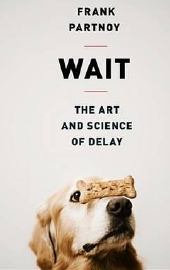In Defense of Delay
A new book, “Wait: The Art and Science of Delay,” argues that while snap decisions can be important in times of danger, our brains need time to assess other factors and resist what economists call “present bias.”
Topics

A new book argues that while snap decisions can be important in times of danger, our brains need time to assess other factors and resist what economists call “present bias.”
Speed can be good, but slow can be better.
So argues the Economist in “No rush: In praise of procrastination,” an essay in the July 7, 2012 issue.
“Businesses are forever saying that they need more creativity,” writes the magazine. “Dithering can help. Ernest Hemingway told a fan who asked him how to write a novel that the first thing to do was to clean the fridge. Steven Johnson, a writer on innovation, argues that some of the best new products are ‘slow hunches’.”
Two things prompted the Economist essay: the new book Wait: The Art and Science of Delay (PublicAffairs, 2012), by Frank Partnoy, and an article in the Academy of Management Journal on the role of contemplation in moral decision making.
In Wait, Partnoy, the George E. Barrett Professor of Law and Finance at the University of San Diego, argues that many decisions need contemplation, not “blink” instinct. Investor Warren Buffett, notes the Economist, “holds stocks for the long term rather than churning them. He writes that: ‘lethargy bordering on sloth remains the cornerstone of our investment style.’”
Writing in the New York Times, Partnoy says: “E-mail, social media and the 24-hour news cycle are informational amphetamines, a cocktail of pills that we pop at an increasingly fast pace — and that lead us to make mistaken split-second decisions. Economists label the problem ‘present bias’: we are vulnerable to fast, salient stimulation.” Partnoy adds:
To accurately tell whether someone is sociable, studies show, we need at least a minute, preferably five. It takes a while to judge complex aspects of personality, like neuroticism or open-mindedness.
…If we know we will overreact to consumer products or housing options when we see a happy face (one reason good sales representatives and real estate agents are always smiling), we can take a moment before buying. If we know female job screeners are more likely to reject attractive female applicants, as a study by the economists Bradley Ruffle and Ze’ev Shtudiner shows, we can help screeners understand their biases — or hire outside screeners.

Comment (1)
siswanto.gatot549